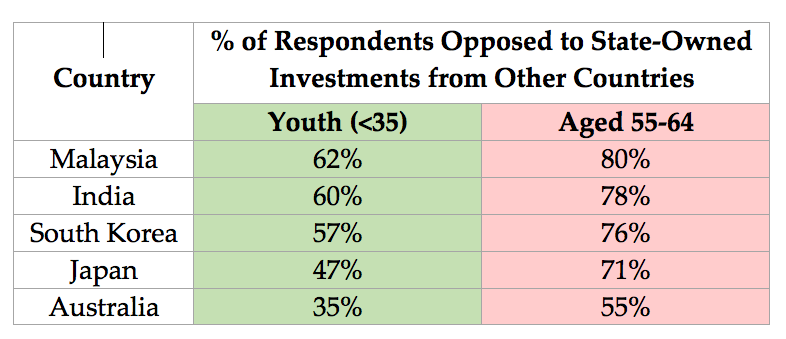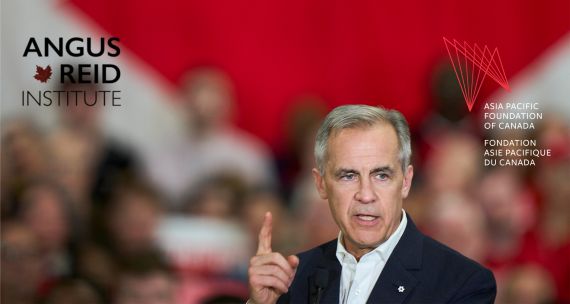It is a common perception that the old are conservative in their outlook, while the youth is far more liberal. But is there a generation gap in public opinion between the young and the old in Canada in their attitudes to Asia? Findings from the Asia Pacific Foundation’s 2016 National Opinion Poll indicate that the answer to this question is more complex than a simple yes or no.
Engagement with Asia
The opinions between various age groups in Canada vary across a range of issues. In terms of engagement with Asia, seniors appear to be the most supportive. 55% of respondents over the age of 65 agree that strengthening economic and political relations with Asia should be Canada's top foreign policy priority. In comparison, only 43% of those aged between 34 and 44, and 48% of those under the age of 35 agree with this statement.
In several instances, we see convergence in the opinions of youth (those under 35) and seniors (those over 65). A large number of youth (72%) and seniors (71%) believe that Canada should undertake friendly cooperation and engagement with China in response to its rising global power.
Similarly, when asked if the growing importance of China as an economic power is more of an opportunity than a threat, youth and seniors are the most optimistic – 54% see China’s rise as an opportunity for Canada. Seniors are also the most optimistic about the growing economic importance of India, and 72% see it as an opportunity for Canada.
Youth and seniors are also the most supportive (24%) of Canada having a closer economic relationship with China. On the other hand, 26% of those aged 35-44 and 29% of those aged 55-64 believe that they would not feel comfortable with Canada having a much closer economic relationship with China. That being said, about half of the respondents from all age groups say that they could be persuaded to support a closer economic relationship with China if they knew more about what was involved.
Speaking overall, Canadians largely support free trade agreements between Canada and other countries. In this case as well, we see that seniors are the largest proponents amongst all age groups, with 82% supporting FTAs.

For all countries included in the survey, seniors were the highest supporters of FTAs compared to other age groups – 88% support an FTA with Australia, 84% with the European Union, 79% with Japan, 59% with India, and 57% with ASEAN. The exception to this is China, where youth are the highest supporters (53%), followed by seniors (49%).
In terms of cultural engagement, when asked if provincial governments should place more emphasis on teaching about Asian history and culture in provincial education systems, more than 50% of the respondents in each age group agree. Again, this has the highest support from seniors, with 69% agreeing with the statement. Canadians also largely support increasing the number of student exchanges and university agreements between their provinces and Asia. Once again, this proposition has the greatest support from seniors (77%). However, most age groups oppose teaching Asian languages in schools. Youth are divided – 45% support placing more emphasis on teaching Asian languages in schools, while 45% oppose it.
Attitudes Towards Asia Pacific Countries
To gauge Canadians’ attitudes towards various countries, the APF’s National Opinion Poll asked respondents to rank a list of countries on a scale of 1 to 7, based on their perceived importance to Canada’s prosperity. Here, we see that age is correlated with the perceived importance of traditional partners. Although all respondents consider the European Union to be highly important (ranked between 5 and 7) to Canada’s prosperity, the perceived importance increases with age. While 74% of the youth perceive relations with EU to be highly important, the number increases to 85% for seniors. Similarly, 96% of seniors consider the United States to be highly important to Canada’s prosperity, compared to 86% of the youth.


Q: Generally speaking, would you say each of the following countries or regions is important or not important to Canada's prosperity
This trend is also visible in the case of Japan and Australia. 61% of youth consider Japan to be highly important, compared to 73% of the seniors. Likewise, 45% of youth consider Australia to be highly important, compared to 58% of the seniors.
Most respondents in all age groups rank China in the high range, with youth (72%) and seniors (73%) considering China to be more important compared to the other age groups.

Openness to Investment
Though seniors seem to be the most open to engaging with other nations, their opinion flips when it comes to investments from other countries. Here, youth seem to be the most liberal.
70% of respondents aged 55-64, and 69% of respondents over the age of 65 think that the government is allowing too much investment in Canadian residential real estate from China. Comparatively, only 51% of the youth perceive the same. Similarly, most age groups oppose investment from state-owned companies from China if the company was trying to buy a controlling stake in a major Canadian company. The opposition is the greatest for those aged 55-64 (89%). In this instance as well, youth are the least opposed (65%). This trend also holds for state-owned investments from Malaysia, India, South Korea, Japan, and Australia.

Moreover, 64% of those aged 55-64 think that state-support for businesses in Asia provides unfair advantage to Asian companies doing business in Canada. Comparatively, only 46% of the youth have the same opinion.
The opposition is low for private investments, and all ages are much less skeptical about them. In fact, increasing age is positively correlated with support for investments from privately owned foreign companies in Canada. 88% of those aged 55-64 and 93% of respondents over the age of 65 support private investments from Australia, compared to 79% of youth. Similarly, 71% of seniors support private investments from India, compared to 56% of youth. And 85% of seniors support private investments from Japan, compared to 70% of youth.
Canadians of all ages are divided about whether Canada would benefit from more Asian investment in the country, with about equal numbers of respondents agreeing and disagreeing with the statement. Most Canadians, particularly seniors (70%), agree that the Canadian government should do more to facilitate trade and investment missions for Canadian companies to visit Asian countries. Moreover, although 51% of seniors agree that Canada should provide economic incentives to encourage more Canadian companies to set up operations in Asia, only 39% of those aged 35-44 agree with the statement.
It is important to note that about half of the respondents from all age groups believe, that it would be bad for Canadians if Asian countries surpassed us economically. Most Canadians also believe that the low cost of labour in Asia makes it difficult for Canadians to compete, although this sentiment is more prevalent among the older demographic.
Policy Priorities
In terms of foreign policy priorities, the older demographic is much more concerned about a range of issues. 74% of seniors and 65% of those aged 55-64 believe that combatting international terrorism should be a very important foreign policy goal for the Canadian government. Youth are less concerned, and only 45% regard this as a high priority. Similarly, only 50% of the youth think that preventing the spread of nuclear weapons should be a very important foreign policy goal, while 83% of seniors and 71% of those aged 55-64 consider this to be critical. Attaining Canadian energy independence is also a high priority goal for more seniors (70%), compared to youth (54%). 43% of seniors also believe that defending our allies’ security should be a very important goal, while only 29% of youth believe the same.
Both youth (50%) and seniors (54%) agree that improving Canada’s standing in the world should be a very important foreign policy goal for the Canadian government.
All age groups consider protecting the jobs of Canadian workers as a critical goal. Limiting climate change is also very important to Canadians of all ages, as is promoting the full participation of women and girls in societies around the world. On the other hand, for all age groups, controlling and reducing immigration is not a concern.
Overall . . .
The findings suggest that although age is linked to opinions on various issues, the results are not simplistic. The older demographic seems more open to engagement and trade, but is wary of investments from other countries.
Like seniors, youth are optimistic about engagement with Asian countries. But unlike seniors, they perceive traditional partners, such as the US and EU, to be less important comparatively.
Canadians of all ages agree on a range of issues. There is common concern about the jobs of Canadian workers as Canada increases engagement with Asian countries. Canadians of all ages also perceive China to be vital to Canada’s prosperity. And they share common views on issues such as climate change and immigration.




